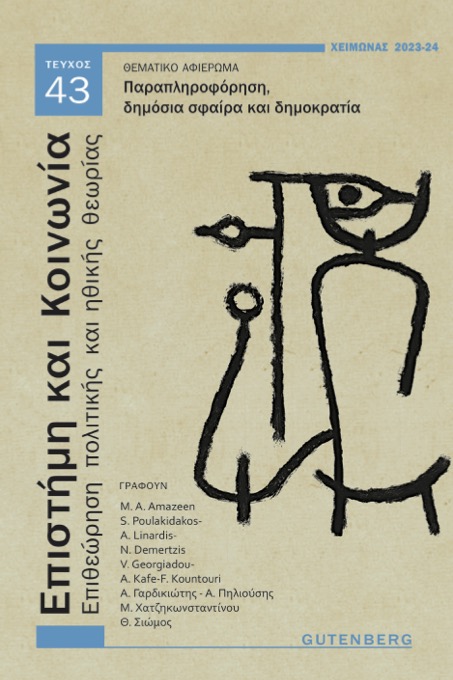The promise and pitfalls of fact-checking in 2022
Περίληψη
Given the evolution and growth of fact-checking around the globe, practitioners and academics have been gathering with increasing frequency to discuss the state of the enterprise. For instance, the first international scientific one-day conference on fact-checking in Athens, Greece assembled in July 2022, to discuss the contribution of universities and research centers in tackling misinformation (EKKE, 2022). Just weeks prior, the 9th annual global fact-checking summit occurred in Oslo, Norway (Larsen, 2022). In October, two conferences convened. Hong Kong Baptist University hosted the virtual conference, ‘Checking the Fact-Checkers: A Global Perspective’ (HKBU, 2022). In the U.S., the 4th annual Conference for Truth and Trust Online gathered in Boston, Massachusetts, providing a forum for academics, industry, non-profit organizations, and other stakeholders to deliberate on the problems facing social media platforms and technical solutions –including fact-checking– to understand and address them (Truth, n.d.). Thus, the continued interest in fact-checking suggests periodic updates on how the practice is evolving has merit.The present article is one such effort which briefly addresses the origins of fact-checking followed by an examination of some of the challenges and opportunities facing the enterprise.
Λεπτομέρειες άρθρου
- Πώς να δημιουργήσετε Αναφορές
-
Amazeen, M. (2024). The promise and pitfalls of fact-checking in 2022. Επιστήμη και Κοινωνία: Επιθεώρηση Πολιτικής και Ηθικής Θεωρίας, 43, 11–33. ανακτήθηκε από https://ejournals.epublishing.ekt.gr/index.php/sas/article/view/36883
- Ενότητα
- Άρθρα

Αυτή η εργασία είναι αδειοδοτημένη υπό το CC Αναφορά Δημιουργού – Μη Εμπορική Χρήση – Παρόμοια Διανομή 4.0.
Οι Συγγραφείς που δημοσιεύουν εργασίες τους σε αυτό το περιοδικό συμφωνούν στους παρακάτω όρους:- Οι Συγγραφείς διατηρούν τα Πνευματικά Δικαιώματα και χορηγούν στο περιοδικό το δικαίωμα της πρώτης δημοσίευσης ενώ ταυτόχρονα τα πνευματικά δικαιώματα της εργασίας προστατεύονται σύμφωνα με την άδεια Creative Commons Αναφορά Δημιουργού - Μη Εμπορική Χρήση - Παρόμοια Διανομή 4.0 Διεθνές , που επιτρέπει σε τρίτους - αποδέκτες της άδειας να χρησιμοποιούν την εργασία όχι για εμπορικούς σκοπούς, με την προϋπόθεση της διατήρησης των διατυπώσεων που προβλέπονται στην άδεια σχετικά με την αναφορά στον αρχικό δημιουργό και την αρχική δημοσίευση σε αυτό το περιοδικό και με διανομή τυχόν τροποποιήσεων υπό την ίδια άδεια όπως και το πρωτότυπο.
- Οι Συγγραφείς μπορούν να συνάπτουν ξεχωριστές, και πρόσθετες συμβάσεις και συμφωνίες για την μη αποκλειστική διανομή της εργασίας όπως δημοσιεύτηκε στο περιοδικό αυτό (π.χ. κατάθεση σε ένα ακαδημαϊκό καταθετήριο ή δημοσίευση σε ένα βιβλίο), με την προϋπόθεση της αναγνώρισης και την αναφοράς της πρώτης δημοσίευσης σε αυτό το περιοδικό.
- Το περιοδικό επιτρέπει και ενθαρρύνει τους Συγγραφείς να καταθέτουν τις εργασίες τους μέσω διαδικτύου (π.χ. σε ένα ακαδημαϊκό καταθετήριο ή στους προσωπικές τους ιστοσελίδες) πριν και μετά από τις διαδικασίες της δημοσίευσης, καθώς αυτό μπορεί να οδηγήσει σε παραγωγική ανταλλαγή ιδεών και σκέψεων καθώς επίσης και σε γρηγορότερη και μεγαλύτερη χρήση και ευρετηρίαση της δημοσιευμένης εργασίας (See The Effect of Open Access).



